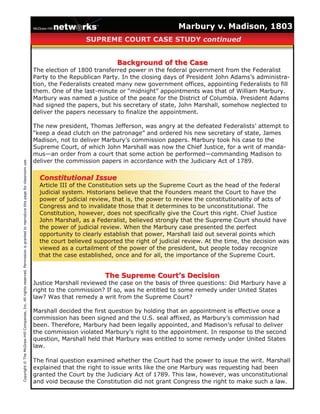More Related Content
Similar to Marbury v. Madison case study (20)
More from Blake Harris (20)
Marbury v. Madison case study
- 1. Background of the CaseBackground of the Case
The election of 1800 transferred power in the federal government from the Federalist
Party to the Republican Party. In the closing days of President John Adams’s administra-
tion, the Federalists created many new government offices, appointing Federalists to fill
them. One of the last-minute or “midnight” appointments was that of William Marbury.
Marbury was named a justice of the peace for the District of Columbia. President Adams
had signed the papers, but his secretary of state, John Marshall, somehow neglected to
deliver the papers necessary to finalize the appointment.
The new president, Thomas Jefferson, was angry at the defeated Federalists’ attempt to
“keep a dead clutch on the patronage” and ordered his new secretary of state, James
Madison, not to deliver Marbury’s commission papers. Marbury took his case to the
Supreme Court, of which John Marshall was now the Chief Justice, for a writ of manda-
mus—an order from a court that some action be performed—commanding Madison to
deliver the commission papers in accordance with the Judiciary Act of 1789.
The Supreme Court’s DecisionThe Supreme Court’s Decision
Justice Marshall reviewed the case on the basis of three questions: Did Marbury have a
right to the commission? If so, was he entitled to some remedy under United States
law? Was that remedy a writ from the Supreme Court?
Marshall decided the first question by holding that an appointment is effective once a
commission has been signed and the U.S. seal affixed, as Marbury’s commission had
been. Therefore, Marbury had been legally appointed, and Madison’s refusal to deliver
the commission violated Marbury’s right to the appointment. In response to the second
question, Marshall held that Marbury was entitled to some remedy under United States
law.
The final question examined whether the Court had the power to issue the writ. Marshall
explained that the right to issue writs like the one Marbury was requesting had been
granted the Court by the Judiciary Act of 1789. This law, however, was unconstitutional
and void because the Constitution did not grant Congress the right to make such a law.
Marbury v. Madison, 1803Copyright©TheMcGraw-HillCompanies,Inc.Allrightsreserved.Permissionisgrantedtoreproducethispageforclassroomuse.
SUPREME COURT CASE STUDY continued
Constitutional IssueConstitutional Issue
Article III of the Constitution sets up the Supreme Court as the head of the federal
judicial system. Historians believe that the Founders meant the Court to have the
power of judicial review, that is, the power to review the constitutionality of acts of
Congress and to invalidate those that it determines to be unconstitutional. The
Constitution, however, does not specifically give the Court this right. Chief Justice
John Marshall, as a Federalist, believed strongly that the Supreme Court should have
the power of judicial review. When the Marbury case presented the perfect
opportunity to clearly establish that power, Marshall laid out several points which
the court believed supported the right of judicial review. At the time, the decision was
viewed as a curtailment of the power of the president, but people today recognize
that the case established, once and for all, the importance of the Supreme Court.
- 2. In his written opinion, Marshall defended the right of the Court to declare a law uncon-
stitutional: “It is emphatically the province and duty of the judicial department to say
what the law is . . . . If two laws conflict with each other, the courts must decide on the
operation of each.” The Supreme Court thus became the final judge of constitutionality,
thus establishing the principle of judicial review.
At the time, observers were much more interested in the practical result of the ruling—
that the Court could not issue the writ, and could not, therefore, force the appointment
of Marbury. Congress could not expand the Court’s original jurisdiction, and the Consti-
tution does not give the Court the authority to issue a writ. They paid much less atten-
tion to the long-term implications of the decision. Here is how a constitutional scholar
evaluates the Marbury decision:
“Over the passage of time [the] Marbury [decision] came to stand for the monumental
principle, so distinctive and dominant a feature of our constitutional system, that the
Court may bind the coordinate branches of the national government to its rulings on
what is the supreme law of the land. That principle stands out from Marbury like the grin
on a Cheshire cat; all else, which preoccupied national attention in 1803, disappeared in
our constitutional law.”
Not until fifty years after rendering the Marbury decision did the Court again declare a
law unconstitutional, but by then the idea of judicial review had become a time-honored
principle.
DIRECTIONS: Answer the following questions on a separate sheet of paper.
1. Why is the Marbury case important in the history of the Supreme Court?
2. In what way did the Marbury decision enhance the system of checks and bal-
ances provided for in the Constitution?
3. Constitutional scholars have pointed out there is an inconsistency in Justice
Marshall’s opinion with respect to what the Constitution specifically provides.
What is that inconsistency?
4. The United States is one of the few countries in which the highest court of the
land has the power to declare a law unconstitutional. Do you believe that such
a power is of benefit to a country? Explain your answer.
5. Justice John Marshall was a Federalist who believed in a strong national gov-
ernment and certainly moved in this direction with his Marbury ruling. Do you
think it is proper for a Supreme Court Justice to allow his or her personal political
opinions to influence the rulings of the Court? Explain.
Marbury v. Madison, 1803Copyright©TheMcGraw-HillCompanies,Inc.Allrightsreserved.Permissionisgrantedtoreproducethispageforclassroomuse.
SUPREME COURT CASE STUDY continued

